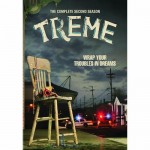Watching the second season of Treme again, I’m struck by the quality of the casting. Making DJ Davis a small man as played by Steve Zahn gives him an underdog quality, even when he’s the architect of his own problems. The regular cast members are thoroughly credible, even in the moments that aren’t. It’s a sign of how thoroughly Wendell Pierce, for example, disappears into Antoine Batiste that when he marched with his high school marching band from the show during Mardi Gras this year, people shouted, “Antoine” not “Wendell.”
Some of the most effective casting decisions were made with characters unlikely to return for season three. Victor Slezak’s Chef Brulard was one of the season’s funniest characters in his enigmatic, deadpan tyranny. Don Bartholomew could conceivably return, but he played producer Don B. with such calm self-assurance that he amplified the sense that DJ Davis was way over his head without moving a muscle. For me, the season belonged to Jon Seda, whose Nelson Hidalgo allowed the show to explore the relationship between money, power and politics. Hidalgo was one of the season’s most complex creations—a predatory capitalist who came to town to profit from the disaster, but his zest for the good life that the city had to offer made him appealing nonetheless. He had enough wealth, charm and stroke to give him access to a rarified life, but he also took his cousin to see Kermit Ruffins. The scene with him watching cartoons in a hotel with a naked woman on the couch next to him says everything you need to know about him, and the end of his story seems deserved but still sad as he realizes his true place on the food chain.
Some of the quibbles over last season seem strained; others less so. Some people complained that characters such as Steve Earle’s Harley spoke in a self-consciously, almost obnoxiously cool way, forgetting that music clubs are filled with self-conscious, borderline obnoxious people who speak like that. Some storylines, though, ring less true, even when the larger points are fair. Annie (Lucia Micarelli) starts the season on tour with the subdudes, and while that provides a starting point for her arc for the season, it’s very unlikely that a band would take a solo street musician who has no original material on tour with them, nor would Shawn Colvin invite her onstage. It’s a moment when the show seems to take liberties with reality to produce a cool musical collaboration like season one’s with the Soul Rebels and John Mooney, but the improbable moments taint Annie’s story. Similarly, the relative ease with which Davis moves between the mainstream hip-hop, bounce and rock-funk worlds with his Brassy Knoll is improbable considering how these communities were largely separate at that point.
Still, the season had a lot of genuine pleasures as well. The interaction between Pierce’s Antoine and his band sounds like it could have been written by someone eavesdropping at the musicians’ union building, and Clarke Peters’ performance as Big Chief Albert Lambreaux made him as enigmatic as many people were in 2006, struggling with a lot including the effort to look like they’re not struggling. Those and countless other moments, along with Khandi Alexander’s ordeal and triumph, more than compensate for any missteps. Treme is playing out big ideas on the day-to-day level, and it’s doing so successfully.




